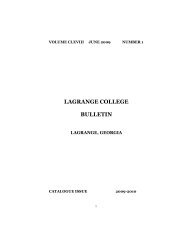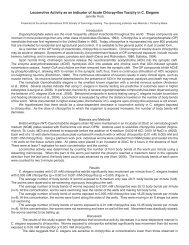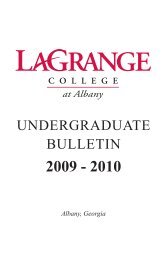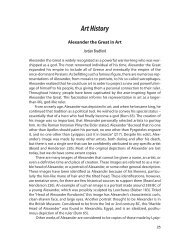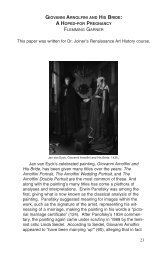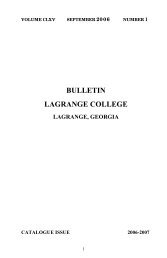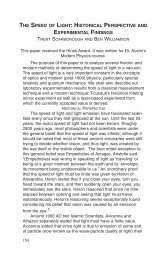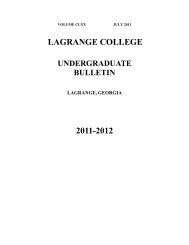Works of Mercy as a Vital Component to Sanctification - LaGrange ...
Works of Mercy as a Vital Component to Sanctification - LaGrange ...
Works of Mercy as a Vital Component to Sanctification - LaGrange ...
Create successful ePaper yourself
Turn your PDF publications into a flip-book with our unique Google optimized e-Paper software.
<strong>Works</strong> <strong>of</strong> <strong>Mercy</strong> <strong>as</strong> a <strong>Vital</strong> <strong>Component</strong> <strong>to</strong> <strong>Sanctification</strong><br />
humbly with his God,” bringing one <strong>to</strong> repentance. 8 Following<br />
the act <strong>of</strong> repentance, one is prepared for justification and forgiveness<br />
by means <strong>of</strong> justifying grace, and sins are pardoned.<br />
One then begins the process <strong>of</strong> being res<strong>to</strong>red <strong>to</strong> the image <strong>of</strong><br />
God. 9 Furthermore, following the suit <strong>of</strong> the Protestant reformers,<br />
Wesley states that the only condition necessary for justification<br />
is faith. Wesley also importantly declares that at justification<br />
there is a “real <strong>as</strong> well <strong>as</strong> relative change” <strong>as</strong> regeneration, or<br />
new birth, begins. 10 The process <strong>of</strong> sanctification begins<br />
through new birth and a real change occurs in the individual.<br />
Here the individual actually begins the process <strong>of</strong> becoming<br />
holy, seeking perfection <strong>of</strong> love, or Christian perfection, <strong>as</strong> the<br />
ultimate goal and purpose <strong>of</strong> religion. 11 <strong>Sanctification</strong> should<br />
now be unders<strong>to</strong>od <strong>as</strong> the process <strong>of</strong> becoming holy.<br />
More specific information concerning Wesley’s via<br />
salutis is needed in two are<strong>as</strong> <strong>to</strong> further explore the effect works<br />
<strong>of</strong> mercy plays on sanctification. It h<strong>as</strong> been stated that Wesley<br />
believed sanctification <strong>to</strong> be a process that is separated from<br />
justification, but the significance <strong>of</strong> such a distinction h<strong>as</strong> not<br />
been maintained. Therefore, a better description <strong>of</strong> the distinction<br />
between justification and sanctification is needed. Second,<br />
there w<strong>as</strong>, and still is, a varying idea <strong>of</strong> what Christian perfection<br />
means. Consequently, there needs <strong>to</strong> be a more adequate<br />
explanation <strong>of</strong> what Christian perfection meant <strong>to</strong> Wesley. It is<br />
helpful <strong>to</strong> study these two <strong>as</strong>pects <strong>of</strong> Wesley’s theology against<br />
other theologians, because some <strong>of</strong> Wesley’s esteemed ide<strong>as</strong><br />
are made more intelligible. Moreover, Wesley’s separation <strong>of</strong><br />
sanctification from justification and his understanding <strong>of</strong><br />
Christian perfection initiate an understanding <strong>of</strong> the transforming<br />
power in works <strong>of</strong> mercy.<br />
Wesley’s Via Salutis Compared against the Reformers<br />
Wesley’s via salutis can be demonstrated <strong>as</strong> opportunistic<br />
for works <strong>of</strong> mercy when it is juxtaposed against the ide<strong>as</strong> <strong>of</strong><br />
the reformers Martin Luther and John Calvin. First, Wesley<br />
understands sanctification <strong>to</strong> be a process partly resulting from<br />
his distinction between justification and sanctification.<br />
<strong>Sanctification</strong> can be illuminated <strong>as</strong> a process when it is compared<br />
against Luther’s focus on justification. It is also important<br />
<strong>to</strong> examine the influence that the Lutheran-oriented Moravians<br />
had upon Wesley. Secondly, one can e<strong>as</strong>ily perceive the<br />
emph<strong>as</strong>is <strong>of</strong> love in Wesleyan theology when Wesley is com-<br />
162



